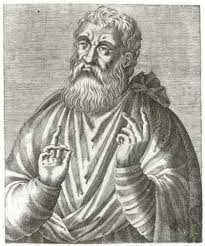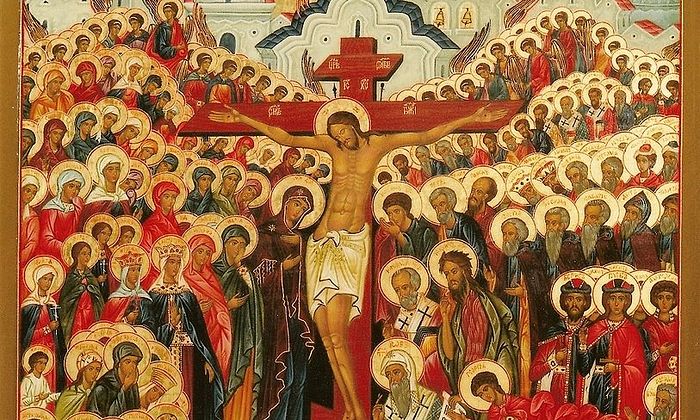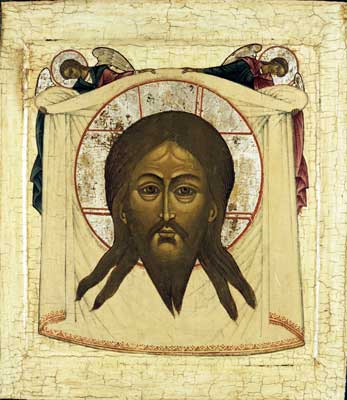
Who are the saints? What is it that marks them off as a group? Were they theologians? Were they seminary professors? Were they Church administrators? What is the golden thread that runs through each and every life among the saints in light?


Who are the saints?
What is it that marks them off as a group?
Were they theologians?
Were they seminary professors?
Were they Church administrators?
What is the golden thread that runs through each and every life
among the saints in light?
They were, and are, simply men and women who encountered God .... and then responded. We might well ask, "But doesn't that describe all Christians?" Yes, in some measure, it does. We point out that the very least response is to become baptized (a night and day difference!). Surely, we have all encountered God. After all, His Image is within us and upon us. Moreover, the Holy Spirit stages encounters with God in the scale of our particular lives — each of us and all of us in the course of our daily lives. He writes messages to us on the walls of our daily experiences. He is the Spirit Who is constantly guiding us, teaching us, and comforting us with intimations of the Divine. Response in some measure is inevitable .... if only at the level of What was that? But so often, our response is inchoate, wholly out of proportion with what has happened to us. For to encounter God, the Incommensurable far above and beyond all incommensurables, is to be confronted with a choice: Shall we go on with the course of life just as it had been? Or will we see that God is not to be taken lightly? Will we see that a door has been opened to us, by God, and that it is a golden door?
To respond to the Divine does not mean that we must become now Biblical archaeologists. It does not mean that we must study philosophy. Many profound essayists have made the point that Christianity does not offer the world a philosophical system. St. Paul wrote that the Greeks have wisdom, but we Christians have foolishness: the Fool on the Hill, Who has laid His Life down for an unloving and indifferent world .... and Him crucified (1 Cor 1:22).
Among our earliest martyred saints, Justin (b. 100), we see a man ardently seeking to fill the God-shaped void within him (to borrow Pascal's conception). He sought to satisfy His longing by chasing after one philosophical school after another. He followed the Stoics (which would eventually bring him to grief at the hands of the Emperor Marcus Aurelius, who was a Stoic philosopher). He followed the Peripatetics. He followed the Pythagoreans. He followed the disciples of Plato. But none of these enabled him to break through into the Divine realm he saw .... but could never find.
One day, he chanced to meet an old man at the seashore in Ephesus who engaged him in conversation. This man had preceded Justin in traveling down similar roads, so he offered a brilliant insight that was obvious once it was stated. Following the bent of culture, Justin had fallen into a conundrum: he had set out to understand ultimate Truth through the unsuitable instrument of human reason. But ultimate Truth is far beyond the capacity of reason's finite categories. Yes, reason might describe bits and parts of the Truth, but it cannot compass Truth. Besides, all philosophical systems begin by making certain basic assumptions (we call them axioms) by bounding the domain that is to be studied. But ultimate Truth has no bounds. It is boundless.
The old man said it is better to begin with experience, minute-by-minute, day-by-day experience, not set theory. Experience makes no a priori assumptions. It simply reports what it sees and hears. It is open-ended. And, unlike philosophy, it is free from the ego of the philosopher. There is no "school" attached to it.
The old man spoke to Justin about the Lord Jesus Christ, Who is the polar opposite of ego or philosophical systems or disciplines of human reason. To borrow the words of an Oxford don of our own time,
| Either this man was, and is, the Son of God, or else a madman or something worse. You can shut him up for a fool, you can spit at him and kill him as a demon, or you can fall at his feet and call him Lord and God. But let us not come with any patronizing nonsense about his being a great human teacher. (C.S. Lewis, Mere Christianity, 32) |
The old man commended to Justin the Hebrew prophets:
| There existed, long before this time, certain men more ancient than all those who are esteemed philosophers, both righteous and beloved by God, who spoke by the Divine Spirit, and foretold events which would take place, and which are now taking place. They are called prophets. These alone both saw and announced the truth to men, neither reverencing nor fearing any man, not influenced by a desire for glory, but speaking those things alone which they saw and which they heard, being filled with the Holy Spirit. (Dialogue with Trypho, VII) |
The encounter with God — this is the sum and total of all meanings.
Abram encountered God. He was not a philosopher nor a mathematician. He was simply a man who had now crossed a boundary. His ordinary, everyday life had met with the extraordinary and the transcendent. Shall he now go on living life as it had been .... as if this had not happened? Everything about his ordinary life counseled in favor of this course, for his was a princely existence in Ur of the Chaldees. Today we would say, "He was set for life." Shall he now leave all this and set off toward a destination he cannot know, suffering inevitable sacrifices beyond numbering? After all, this is the point about leaving civilization and entering wilderness — entering the unknown, the unpredictable, the insecure, exposed and vulnerable to every threat and danger.

Moses encountered God.
He was sitting beside a fire,
and
God spoke to Him.
Before this,
he lived as a prince of Egypt,
the son of mighty Pharaoh's daughter.
Shall he now leave all this
and
take the path God had set before him?
God had proposed
an impossible task:
overcoming mighty Egypt and liberating an enormous population long inured to slavery.
Again the choice was to leave civilization.
(Down to our time,
by the way,
Abram's Babylon and Moses' Egypt remain as bywords for great civilizations;
they are the civilizations.)
Moses replied to God in humility,
"But I am a stammerer and a stutterer" (Exod 4:10).
And the Lord God replied,
"I will be with your mouth and teach you what you shall say" (Exod 4:12).
The story of Abram and the story of Moses reveal something most important about God. The Holy Spirit does not stage encounters with the Divine in order to assemble a "dream team," "all-stars," or a "league of superheroes." He seeks each one of us, ordinary and fallible us. And the Psalmist reveals that He has a special heart for the lowly and the humble: "I will be with you," He promises.
The Apostle Paul has written,
|
But God has chosen the foolish things of the world to put to shame the wise, and God has chosen
the weak things of the world to put to shame the things which are mighty .... (1 Cor 1:27) |
Are we not "the foolish" and "the weak"? In the end, we are but clay, insentient, gross, and inert clay. Whatever it is that glistens within us having apprehensions of the Divine and the capacity to know ultimate Truth, this is of God, not of our doing.
The Apostle Paul goes on to tell us that
| "We have this treasure in clay jars" (2 Cor 4:7) |
We look at our ourselves and feel ourselves — our grossness and our fineness, our darkness and our light, our descending ways and our ascending ways — and we understand what he means. Treasure. Yet we are made of clay. We turn to dust. Our bodies become heavy and stiff and cracked. Surely, though, this is not all! For all along we have experienced our living souls, and through them we have known the Presence of God, which is the spark and shimmer and boundless consciousness illuminating every human life born into the material world.
Our souls are immortal, for we know they have no age. The "Me" inside we experienced as young children we also experience at at age eighty or ninety: that same "Me." Yes, our souls expand in knowledge and understanding yet are changeless in essence. The nous (vs. our psychological part) is a true Instance of God within us. Moreover, even atheists in the post-CPR period are given to know of life continuing after the cessation of bodily function — in the form of "after death experiences."
Meantime, those standing on the "other side", keeping vigil near the body, witness a sudden and dramatic change. As a hospital chaplain seeing this frequently, I would later watch movies of people before and after death and think, "It's no use. The actor depicting the corpse is asked to lie still and not breathe. But it is no use. For the difference between the living, bountiful, radiating human and the dead corpse, collapsed from within, leaving a dull, gray shell .... is too much. This difference is too great. This obvious and overwhelming before-and-after defies the greatest actor's art. To imitate all-clay and no-life? What actor could attain that?"
Yet,
our faith teaches us that the body is not merely the first stage of a rocket,
falling as junk back to Earth.
Prince Hamlet's words, "When we have shuffled off this mortal coil" (III.1),
come closer to it.
For here we picture
a snake emerging from its moulted skin.
The newly emerged creature is brilliantly colored,
miraculously fresh.
Like the Monarch butterfly emerging from the chrysalis,
it is an impossibility, it so luminous!
Meantime,
the old coil haunts the new life with its lifeless dun color.
The lithe, animate human will be resurrected in all of his or her beauty ..... whatever that may be.
To borrow St Paul's words,

|
"We shall all be changed — in a moment, in the twinkling of an eye"
(1 Cor 15:51-52)
"this tent, is destroyed, [yet] we have a building from God, a house not made with hands, eternal in the Heavens" (2 Cor 5:1) |
.... says St. Paul, the tanner and tent-maker. He knows what an old, leather tent looks like.
This phrase, "not made with hands," points to a mysterious icon of the same name. By tradition, The Lord called for a bowl of water and a towel. Then, washing his face and wiping it with the cloth, His Image was imprinted into the receptive material. In one sense the Image is not physical but somehow the emanation of Divine energies, yet in another it is physical: a freshly "painted" icon, presented to a Syrian ruler of Edessa, and then hung over the principal city gate, inspiring and blessing all who passed beneath it. Through it, we gaze through a window into Absolute Reality, radiating form and life and containing all life before and after its emanation .... and if human, eternal.
This effulgence or radiance of Divine Energies, which has no beginning nor end, does not merely project an airy image or generate a hologram. Rather, the life it creates is more real and more perfect than ever we encounter on Earth: "made without hands, eternal in the Heavens." It is the Earthly manifestation which is unreal, temporary, and an illusion, like the moulted snake skin pointing to a something that finally cannot be grasped or contained by the world .... this luminosity. The true and eternal Image is what emerges from the dusty coil, which can never be fashioned by human hands and is eternally fresh and new and alive.
Those who have encountered angels or those from the Greater Life, will tell you that this was no airy vision, but rather very present, even overwhelming, and realer than real. They are awe-struck by this powerful and palpable presence that you can hear and feel and see. The Scriptures themselves attest it: for the signature greeting of a angel or the Risen Christ is, "Be not afraid."
The encounter with God, often seeming subtle — an impossible coincidence, a startling synchronicity — must not be passed over or ignored. For make no mistake about it: you have stumbled into the Presence of God, Who alone is the Master of all timings, Who alone knows the whole of your life in every detail. Attend! Remove your sandals, for this is holy ground. And having attended, you will discover that more and more will be revealed .... even the direction of your life.
Shall you follow this direction? (What a question?!) Shall you make it your holy compass, your reason for being, the center and summit of your life? The world will always beckon, promising its false values and rewards. But we must not be seduced by the illusion of security. For in the end, there is only God. This world He has made to show us goodness and beauty points out to perfections of goodness and beauty. They are not here. This here we have is not the stuff that will last. There is only God. And He calls to us. He calls us to His side. For such a destiny is the very reason for our conception and birth. His Son, the Lord Jesus Whom He sent as His once-for-all Emissary, longs to confess us before the Father — that we are His .... and Theirs .... One with them .... even as They are One (Jn 17:10-11).
This is the moment of our lives, calling to us from our youth. Do not miss it. Do not take it lightly. Ours is a calling God, but the moment is always now, never later. For there are two ways, one of life and one of death (Didache, 1). And our refusal of God must always result in His refusal of us.
Do not delay!
Run to His side!
And never, ever let Him go.
In the Name of the Father and of the Son and of the Holy Ghost.
Amen.